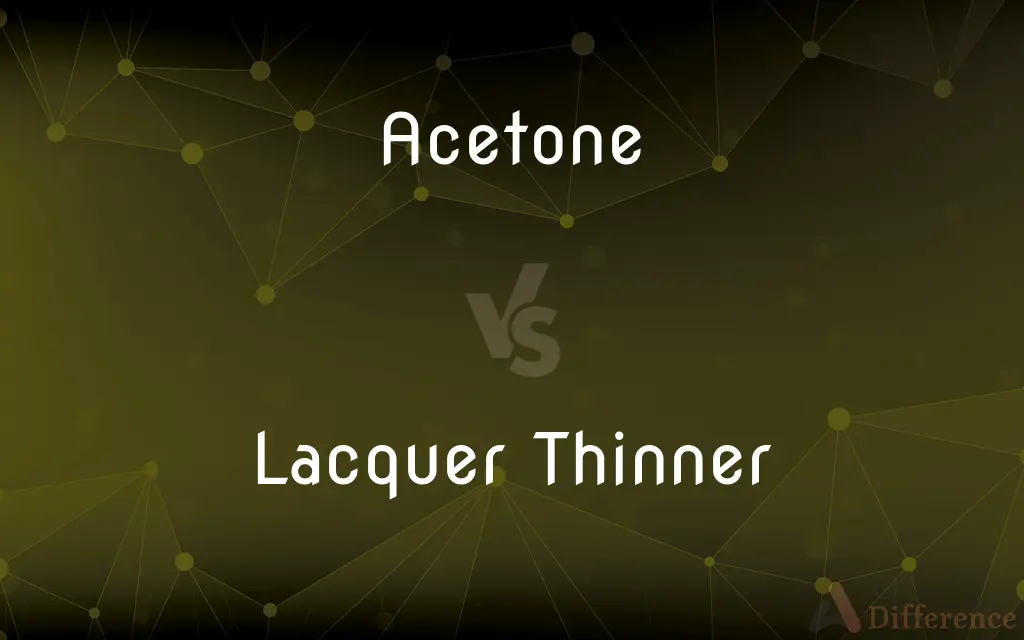Acetone vs. Lacquer Thinner — What's the Difference?
By Tayyaba Rehman — Published on October 27, 2023
Acetone is a simple organic solvent used for various applications, while Lacquer Thinner is a blend of solvents designed to dissolve and thin lacquers.

Difference Between Acetone and Lacquer Thinner
Table of Contents
ADVERTISEMENT
Key Differences
Acetone, known for its versatility, is a clear and highly volatile solvent widely used in laboratories and everyday products. Lacquer Thinner, on the other hand, is specifically formulated to modify the consistency of lacquers for painting applications. Both serve as solvents, but their uses and compositions diverge.
Acetone's molecular structure allows it to dissolve a wide variety of compounds, making it invaluable in both industrial and domestic contexts. Lacquer Thinner, although adept at thinning lacquers, is a mixture of various solvents like toluene, acetone, and methyl ethyl ketone, giving it a distinct composition and range of applications.
When it comes to removing nail polish, acetone is a go-to choice, known for its effectiveness and rapid action. Lacquer Thinner, although potent, is less common for personal care and is more renowned in the paint and automotive industries for adjusting lacquer's viscosity and cleaning tools.
In terms of safety, both Acetone and Lacquer Thinner require care during handling. Inhalation or prolonged skin contact can be harmful, but the blend of chemicals in Lacquer Thinner often makes it more hazardous than pure acetone. While both solvents have their distinct purposes, understanding their individual properties ensures their appropriate and safe utilization.
Comparison Chart
Composition
Single compound (C3H6O).
Blend of solvents (e.g., toluene, acetone, methyl ethyl ketone).
ADVERTISEMENT
Common Uses
Nail polish remover, solvent in labs.
Thinning lacquers, cleaning brushes/tools in paint industry.
Volatility
Highly volatile.
Varies based on specific blend but generally volatile.
Toxicity
Flammable and can be harmful if inhaled.
Often more toxic due to a blend of chemicals; flammable.
Origin
Organic compound, simplest ketone.
Specifically formulated blend for lacquer-related applications.
Compare with Definitions
Acetone
Acetone is a clear, colorless solvent.
I used acetone to remove my nail polish.
Lacquer Thinner
Effective in cleaning paint tools and brushes.
After painting, I cleaned my brushes with lacquer thinner.
Acetone
It's the simplest form of ketone.
Acetone, being a ketone, has a carbonyl group in its structure.
Lacquer Thinner
It's a blend of different solvents.
Lacquer thinner contains solvents like toluene and acetone.
Acetone
Commonly found in nail polish removers.
Make sure your nail polish remover contains acetone for best results.
Lacquer Thinner
Lacquer Thinner is used to modify the consistency of lacquers.
I added lacquer thinner to adjust the paint's viscosity.
Acetone
Highly volatile and evaporates quickly.
The acetone evaporated almost instantly when I spilled it.
Lacquer Thinner
Primarily used in the paint and automotive industries.
The auto body shop uses lacquer thinner for paint jobs.
Acetone
Can dissolve various organic compounds.
I used acetone to dissolve the plastic residue.
Lacquer Thinner
More hazardous than pure solvents due to its blend.
Ensure proper ventilation when using lacquer thinner.
Acetone
A colorless, volatile, extremely flammable liquid ketone, C3H6O, widely used as an organic solvent. It is one of the ketone bodies that accumulate in the blood and urine when fat is being metabolized.
Acetone
(organic compound) A colourless, volatile, flammable liquid ketone, (CH3)2CO, used as a solvent.
Acetone
A volatile liquid consisting of three parts of carbon, six of hydrogen, and one of oxygen; pyroacetic spirit, - obtained by the distillation of certain acetates, or by the destructive distillation of citric acid, starch, sugar, or gum, with quicklime.
Acetone
The simplest ketone; a highly inflammable liquid widely used as an organic solvent and as material for making plastics
Common Curiosities
Is acetone harmful to the skin?
Prolonged skin contact with acetone can cause dryness and irritation.
What is acetone commonly used for?
Acetone is commonly used as a solvent, especially in nail polish removers.
Can I use acetone as a replacement for lacquer thinner?
While both are solvents, they have different properties. Acetone might not always work effectively as a lacquer thinner substitute.
What is the main purpose of lacquer thinner?
Lacquer thinner is primarily used to thin lacquers and clean brushes and tools in the paint industry.
Why is lacquer thinner more hazardous than pure acetone?
Due to its blend of various chemicals, lacquer thinner can present a broader range of health hazards compared to pure acetone.
Are both acetone and lacquer thinner flammable?
Yes, both are flammable and should be kept away from open flames.
What are the key components in lacquer thinner?
Lacquer thinner contains a blend of solvents like toluene, acetone, and methyl ethyl ketone.
Can I use lacquer thinner to remove nail polish?
While it might work, it's not recommended due to its stronger and potentially harmful chemicals.
Which one evaporates faster, acetone or lacquer thinner?
Acetone is highly volatile and generally evaporates faster than lacquer thinner.
Is it safe to inhale acetone fumes?
Inhaling acetone fumes can be harmful and may lead to respiratory and neurological effects.
Can I use acetone to clean paintbrushes?
Yes, acetone can be used to clean paintbrushes, though it's most effective with certain types of paint.
How should I store acetone and lacquer thinner?
Both should be stored in a cool, dry place away from open flames and out of reach of children.
Is it safe to dispose of acetone and lacquer thinner down the drain?
No, it's best to dispose of them as hazardous waste according to local regulations.
Are there different types of lacquer thinners available?
Yes, there are various formulations tailored to specific types of lacquers and applications.
Is lacquer thinner suitable for all types of paints?
No, it's specifically formulated for lacquer-based paints.
Share Your Discovery

Previous Comparison
Loan vs. Limit
Next Comparison
Trading Account vs. Manufacturing AccountAuthor Spotlight
Written by
Tayyaba RehmanTayyaba Rehman is a distinguished writer, currently serving as a primary contributor to askdifference.com. As a researcher in semantics and etymology, Tayyaba's passion for the complexity of languages and their distinctions has found a perfect home on the platform. Tayyaba delves into the intricacies of language, distinguishing between commonly confused words and phrases, thereby providing clarity for readers worldwide.
















































